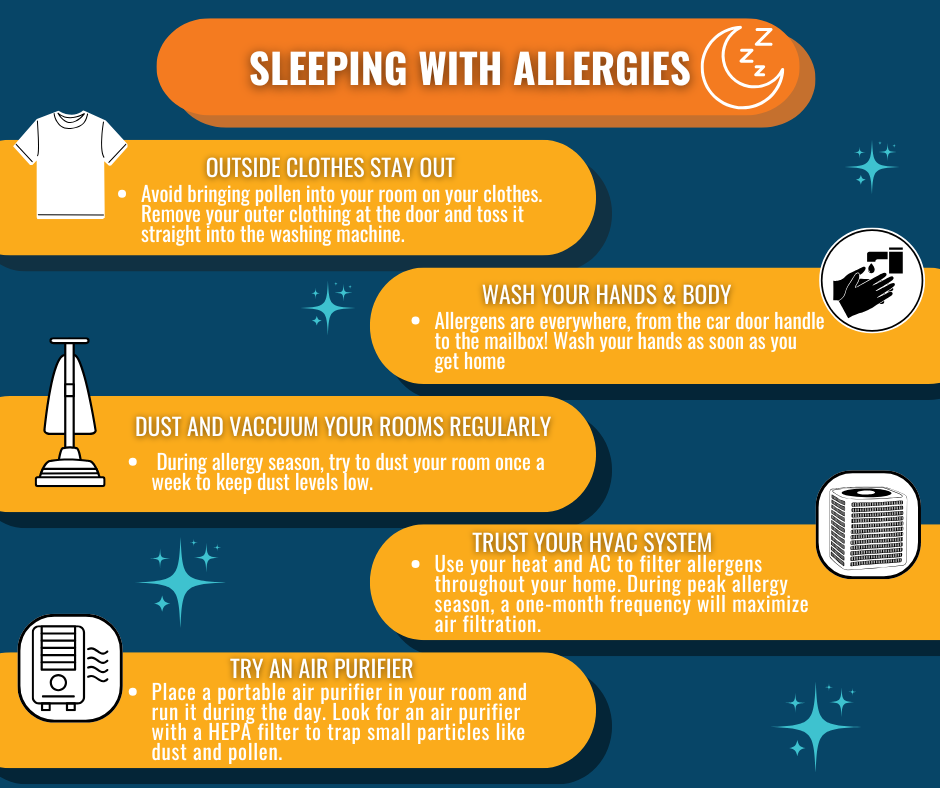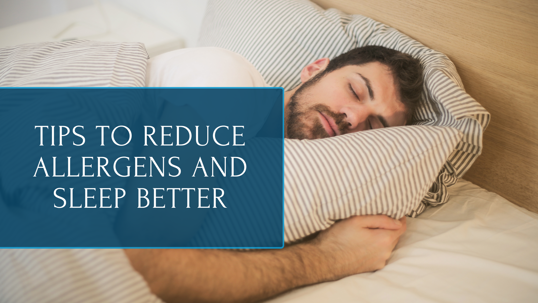Long nights of wheezing, tossing, and turning are known to leave Raleigh-area allergy sufferers drained during the area's extensive allergy season. From pollen to dander and even leaf mold, allergens are everywhere, but that doesn’t mean you must suffer in your home. Learn how to prevent a buildup of allergens in your bedroom to sleep better despite the season.
Allergies and Sleep: What’s the Connection?
Considerable research links allergies to poor sleep, which contributes to daytime fatigue and may even increase your risk of developing a sleep disorder.
Roughly 40% of Americans have seasonal allergies, meaning millions of households are trying to get a good night’s sleep despite a cough or drippy nose.
While it’s virtually impossible to create a completely allergy-free home, the quantity of irritants in your home can be minimized through simple habits, cleaning, and air filtration.

How to Tackle Allergies in Your Bedroom
1. Keep Pollen Out
During allergy season, keep windows and doors closed, especially from late morning through early evening when pollen levels peak.
2. Shower Up
When you get home, remove your outer layers of clothing at the door and shower to get pollen off your skin and hair.
3. Banish Dust Mites From Your Bedroom
Dust and vacuum your bedroom weekly to stay ahead of dander, pollen, and other particulates. If you have severe allergies, clean your bedroom every other day.
4. Maintain Your HVAC System
Run your home’s HVAC system (heating or cooling) to filter air through the HVAC filter. HVAC filters trap particulate matter and prevent it from recirculating through your home. Maintain your HVAC system with annual maintenance and frequent filter changes (at least every 1-3 months) for maximum efficacy.
5. Use an Air Purifier
Augment your home’s HVAC system with a stand-alone air purifier. Like your HVAC filter, an air purifier filters the air, removing particulate matter from circulation. Opt for a portable air purifier with a HEPA filter, which is rated to trap the smallest airborne particulates.
Where Should I Position an Air Purifier in My Bedroom?
For maximum efficacy, place your air filter in the middle of your room on a slightly elevated object, such as a sturdy shoebox. Ensure the unit is relatively close to a likely source of allergens, like a pet bed or a surface with a penchant for collecting dust.
Read More: Three Ways to Improve Indoor Air Quality
Do Allergy Symptoms Get Worse at Night?
It’s not just you. Allergy symptoms often worsen at night because of:
- Histamine – Histamine is the chemical that triggers allergy symptoms and tends to be present in higher quantities in the body at night.
- Pollen levels – Pollen brought into your bedroom during the day has had time to accumulate by nighttime, and you may be stirring it up as you prepare for bed.
- Body position – Lying down changes how mucus moves in your sinuses. This can cause mucus to gather in your nasal passages, leading to sneezing and coughing.
- Temperature changes – Temperature and humidity changes may affect nasal mucus production, contributing to irritation and post-nasal drip.
Does Sleeping with a Humidifier Help Allergies?
Some individuals find that using a humidifier can help alleviate their allergy symptoms. A portable humidifier can help thin mucus and moisturize nasal passages, making breathing easier. However, excessive humidity can lead to the growth of mold and mildew, which can worsen allergy symptoms. For optimal indoor air quality, keeping your home's humidity levels between 30% and 50% is recommended.
Having a difficult time maintaining optimum humidity levels? We can help you manage your home’s indoor humidity levels.
Take On Allergy Season with Help from Yellow Dot Heating & Air Conditioning
Manage your allergy symptoms by utilizing your home's HVAC system. Our team is on hand and ready to help improve indoor air quality at your home, allowing you to breathe easier all year round.
Call 919-925-4235 or contact us online to schedule HVAC, electrical, or plumbing services in Raleigh, Chapel Hill, and the surrounding areas.

